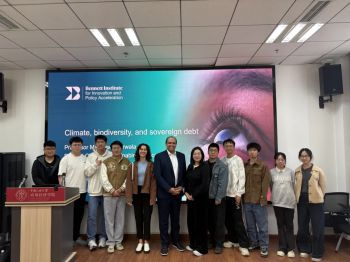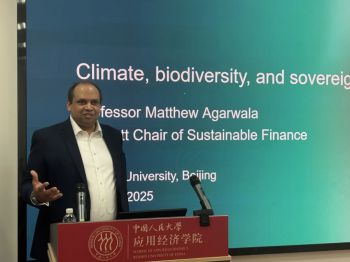Professor Matthew Agarwala delivers a lecture on "Climate Change and Credit Ratings" at Renmin University
Posted on behalf of: Sussex Global Engagement
Last updated: Monday, 28 April 2025


On 12th April 2025, Professor Matthew Agarwala, an economist at the University of Sussex Business School, successfully delivered an academic lecture entitled "Climate Change and Credit Ratings: The $200 Billion Puzzle" at the School of Applied Economics of Renmin University of China.
Renmin University of China is one of Sussex's most important strategic partner universities in China. The two universities have achieved fruitful results since the establishment of the partnership in 2009. In order to promote academic exchanges and cooperation between the two universities, the University of Sussex and Renmin University of China jointly established the "Sussex-Renmin Strategic Fund" in 20219 for mutual visits and academic cooperation projects between scholars of the two universities.
This lecture is not only the fruitful result of the strategic cooperation between the University of Sussex and Renmin University of China, but also an important manifestation of the University of Sussex's emphasis on deepening exchanges with Renmin University of China in the fields of academic research and talent training, further consolidating and strengthening the close ties and cooperative relationship between the two universities.
Lecture content review
In the lecture, Professor Agarwala used vivid cases and detailed data to show the teachers and students present how climate change triggers a chain reaction around the world, ultimately affecting the economic life of individuals and countries. He particularly pointed out that with the rise in global temperatures and the frequent occurrence of extreme weather events, the credit ratings of many countries are facing unprecedented challenges. These changes not only increase the cost of public services, but may also be transmitted to areas such as personal mortgages through the credit rating system, thereby affecting the economic situation of every family.
In the core part of the lecture, Professor Agarwala cited the latest research results of the Bennett Institute, and elaborated on how climate change has led to the downgrade of global sovereign credit ratings and the profound impact of this change on the global financial system. He emphasized that the downgrade of credit ratings will directly lead to an increase in financing costs, which will in turn affect the sustainability of the global economy. This view resonated widely with the teachers and students present, and everyone had in-depth exchanges and discussions with Professor Agarwala on related topics.
In addition to an in-depth analysis of the relationship between climate change and credit ratings, Professor Agarwala also explored the impact of climate change on the stability of financial, natural and economic systems from a multidisciplinary perspective. He combined knowledge from multiple disciplines such as economics, ecology, and social anthropology to provide an interdisciplinary feast of ideas for the teachers and students present. Everyone said that Professor Agarwala's research not only has extremely high academic value, but also provides valuable policy recommendations and practical guidance for addressing climate change.
Cooperation and Prospects in the Context of Internationalisation and Globalisation
As globalisation deepens, international cooperation has become an important way to promote academic research and educational innovation. The strategic cooperation between the University of Sussex and Renmin University of China is an important step taken by the two universities in the process of internationalisation. By strengthening exchanges and cooperation with internationally renowned universities, the University of Sussex will be able to better integrate into the global academic network and promote the internationalisation of academic research.
Looking ahead, the University of Sussex will continue to uphold the philosophy of internationalisation and globalisation and deepen cooperation and exchanges with world-renowned universities. We look forward to working with more international partners to jointly address global challenges and promote innovation and development in academic research. At the same time, we also look forward to outstanding scholars such as Professor Matthew Kane Agarwala continuing to play a leading role in the field of climate change and contributing more wisdom and strength to the global response to climate change.
